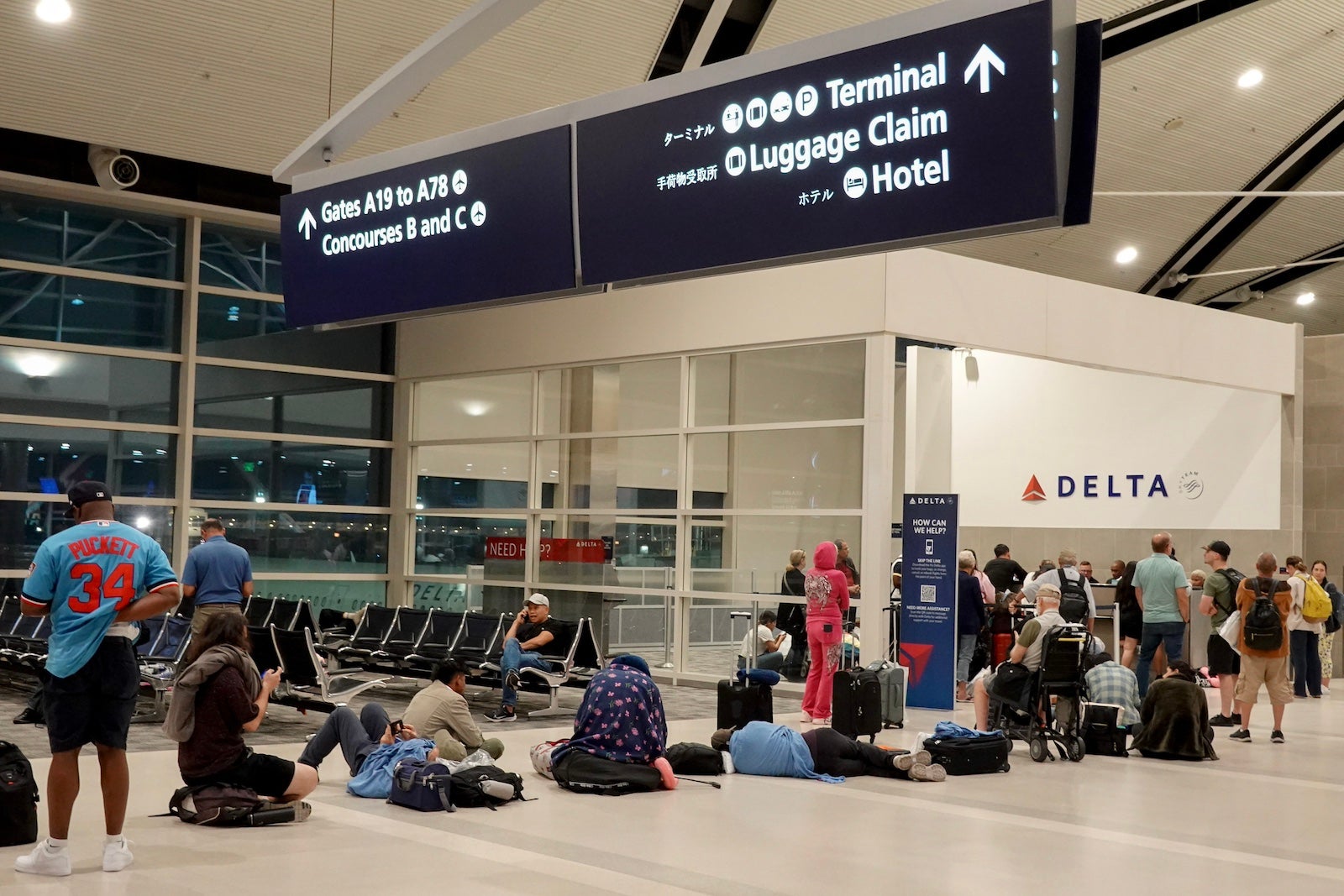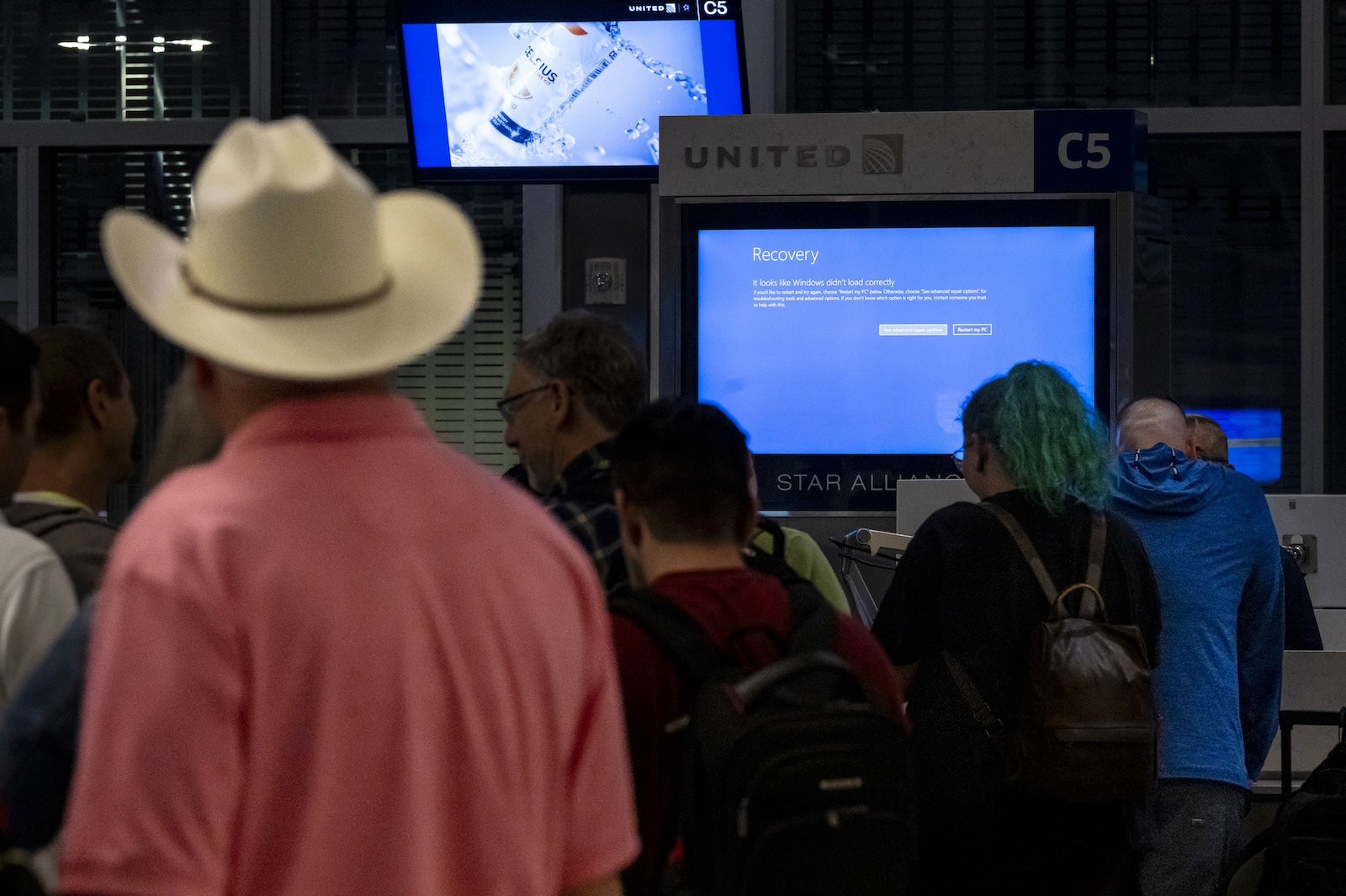Editor’s note: this story has been updated with new information
Mass flight cancellations snarled U.S. airports for a third consecutive day Sunday, the lingering fallout after a Friday tech glitch affecting Microsoft Windows clients caused worldwide I.T. infrastructure outages— and upended many airline operations, even prompting an apology from Delta Air Lines’ CEO Sunday afternoon.
Delta and United Airlines again canceled hundreds of flights Sunday, as the two carriers continued working to recover their operations in the wake of the problems caused by a third-party vendor late last week.
The problems have led to packed terminals at airports across the country this weekend, with long, snaking lines of travelers waiting to speak to customer service common — and images of passengers sleeping on airport concourse floors.
Want more aviation news? Sign up for TPG’s free biweekly Aviation newsletter.

By Sunday afternoon, airlines had canceled more than 1,200 flights in the U.S.
Delta led the way with more than 700 cancellations Sunday – nearly a fifth of its operation, according to data from flight-tracking site FlightAware. United was second, with 259 cancellations Sunday — about 8% of its schedule.
In all, airlines have canceled more than 6,700 flights in the U.S. since Friday’s disruption — close to 3,200 of those on Delta, per FlightAware data.
In a note to customers Sunday afternoon, Delta CEO Ed Bastian apologized for the prolonged disruptions.
“Delta is in the business of connecting the world, and we understand how difficult it can be when your travels are disrupted,” Bastian said. “Thank you for your patience as we work through these issues, restore our operation and return to the reliability you expect from Delta.”
Delta Air Lines
The Atlanta-based carrier said Sunday it was still in the process of getting operations back on track following the I.T. outage at Austin-based Crowdstrike, which caused it — and several other U.S. airlines — to temporarily pause flying on Friday.
The problems affected the Microsoft Windows operating system that power numerous Delta applications, Bastian said. The problems affected a key crew-tracking tool, he added, leaving the airline unable to “effectively process the unprecedented number of changes” triggered by the shutdown.
Bastian said the problems were made worse by the fact that the disruptions came on what was expected to be Delta’s busiest travel weekend of the summer.
Thursday was the third-busiest day ever across the country at Transportation Security Agency checkpoints.
Unaccompanied minor flying on pause
Delta has extended its pause on unaccompanied minor flying through Tuesday (July 23) and extended travel waivers that allow passengers more flexibility to make itinerary changes — a step taken by other affected carriers, including United.
How Delta is responding
Delta said Sunday it is offering meal vouchers, hotel accommodations and transportation to affected customers as needed. And, “as a gesture of apology,” Bastian said, the carrier is providing customers with travel vouchers and Delta SkyMiles.
Delta continued its operational recovery Sunday following an outside vendor technology issue that prompted the airline and many others to pause flying for several hours on Friday.
— Delta News Hub (@DeltaNewsHub) July 21, 2024
DOT refund policy
Keep in mind, under U.S. Department of Transportation policy, travelers whose flight is canceled or significantly delayed are entitled to a refund — back to their original payment method — for the unused portion of their ticket if they ultimately choose not to fly, and don’t accept rebooking.
Tech challenges persist
Delta notes that customers can monitor and manage itinerary changes on the airline’s website and mobile app. However, the carrier noted these tools “have been inundated with traffic, causing intermittent performance challenges.”
The airline said it’s working to stabilize those tools, and warned that its ability to respond to social media messages is also limited.
United Airlines
In its most recent update Saturday, United told TPG its customer service call systems had been fully restored, and noted most technology systems were back up and running — but warned of additional cancellations and delays likely over the course of the weekend.
U.S. flight cancellations on Saturday were down 37% from Friday, FlightAware data shows — but still topped 1,600 for the day, led by Delta’s 1,200.
Key Delta and United hubs have been the most heavily affected U.S. airports this weekend, from Hartsfield-Jackson Atlanta International Airport (ATL) to Minneapolis-St. Paul International Airport (MSP), Denver International Airport (DEN) and Newark Liberty International Airport (EWR) — among others.

What do the airlines owe you after a cancellation or delay?
Though the issues stemmed from a third-party vendor, not the airlines directly, the U.S. Department of Transportation considers these cancellations and delays to be “controllable,” — in other words, the airline’s responsibility — an agency spokesperson told TPG Friday.
That means promises made by airlines spelled out in the Airline Customer Service Dashboard would apply. Here’s what each airline has told the DOT it will guarantee following a cancellation or significant delay.
Other important resources:
- Flight delayed or canceled? Here’s what to do
- You are entitled to a refund for your canceled flight – even if the DOT says you’re not
- Here are airline passenger rights to know during a travel meltdown
- 8 best credit cards with travel insurance in July 2024
Transportation Secretary Pete Buttigieg took to social media Saturday with a reminder of the agency’s refund policies.
“I am hearing reports of some airlines only offering flight credits,” Buttigieg wrote on X, formerly Twitter. “Let me be clear – you are entitled to get your money back promptly if your flight is canceled and you don’t take a rebooking.”
I am hearing reports of some airlines only offering flight credits to passengers for cancelled flights. ⁰⁰Let me be clear — you are entitled to get your money back promptly if your flight is cancelled and you don’t take a rebooking.
— Secretary Pete Buttigieg (@SecretaryPete) July 20, 2024
An outlier in 2024
The operational disruptions over the last 48 hours come amid a year that’s been largely without major air travel meltdowns.
Between Jan. 1 and July 18, U.S. carriers canceled 1.3% of flights, per FlightAware. Compare that to the 2.6% cancellation rate during that same period in 2022.
Delta specifically touted its operational reliability during the carrier’s second-quarter earnings call on July 11. The carrier scored highly on both the recent J.D. Power airline rankings and TPG’s 2024 Best Airlines Report due, in part, to its operational reliability.
The industry’s most recent large-scale operational problems include a multi-day snafu at United last summer which prompted the carrier to step up its collaboration with the Federal Aviation Administration on operations at Newark …and a January 2023 FAA computer outage that prompted the first nationwide ground stop since September 11, 2001. The latter incident came just days after Southwest Airlines’ 2022 holiday operational disaster.
Related reading:
- When is the best time to book flights for the cheapest airfare?
- The best airline credit cards
- What exactly are airline miles, anyway?
- 6 real-life strategies you can use when your flight is canceled or delayed
- Maximize your airfare: The best credit cards for booking flights
- The best credit cards to reach elite status
- What are points and miles worth? TPG’s monthly valuations



